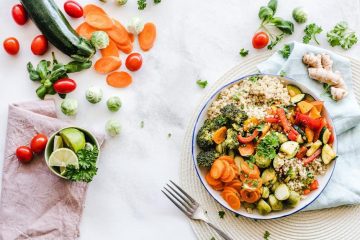Table of Contents
- Exploring Comfort Foods for a Hasty Recovery
- Nutritional Powerhouses to Boost Your Immune System
- Hydrating Broths and Soups for Soothing Relief
- Gentle Foods to Soothe an Upset Stomach
- Herbal Teas and Remedies to Complement Your Healing
- Q&A
- Key Takeaways


Exploring Comfort Foods for a Hasty Recovery
When you’re under the weather, finding the right food can make a world of difference in your comfort and recovery. Broths and soups are often the first choice. Their warm, soothing nature helps hydrate the body while providing essential nutrients. Rich in vitamins and minerals, a simple chicken or vegetable soup can help alleviate congestion and soothe a sore throat. Consider adding ingredients like garlic and ginger for their immune-boosting properties. Here are some great options:
- Chicken noodle soup – Classic comfort with protein and hydration.
- Miso soup – Packed with probiotics, excellent for gut health.
- Vegetable broth – A vegan option rich in vitamins.
Next on the list are easy-to-digest foods, which are gentle on the stomach. Opt for bland foods that won’t exacerbate nausea or discomfort. Foods like bananas, rice, applesauce, and toast (BRAT diet) are often recommended for their low fiber content and ease of digestion. Additionally, these foods can help stabilize your appetite without overwhelming your digestive system. Here’s a quick reference:
| Food | Benefits |
|---|---|
| Bananas | Rich in potassium, easy on the stomach. |
| Rice | Provides energy without causing irritation. |
| Applesauce | Source of pectin, aiding digestion. |
| Toast | Simple carbohydrates for energy, easily digestible. |
don’t overlook the power of hydration. Staying hydrated is crucial when you’re sick, and that doesn’t just mean water. Herbal teas, clear juices, and electrolyte drinks can keep your body replenished. Consider beverages that have a soothing effect, such as chamomile or peppermint tea. Not only do they provide fluid, but they also offer additional benefits such as calming effects or relieving congestion. Add the following to your hydration list:
- Warm herbal teas – Soothing and hydrating.
- Coconut water – Natural electrolytes.
- Clear broth – Hydrating and nutritious.


Nutritional Powerhouses to Boost Your Immune System
Nourishing your body with the right foods can significantly enhance your immune response, especially when you’re feeling under the weather. Incorporating a variety of vibrant fruits and vegetables into your meals not only adds color to your plate but also loads your body with essential vitamins and minerals. For instance, citrus fruits like oranges, grapefruits, and lemons are rich in vitamin C, a powerful antioxidant known to boost white blood cell production. Leafy greens such as spinach and kale provide necessary nutrients like vitamin A and iron, which are pivotal for proper immune function.
In addition to fruits and vegetables, lean proteins such as chicken, fish, and beans are critical for maintaining overall health. These foods contribute to the repair and development of immune cells. Additionally, incorporating healthy fats like those found in avocados and nuts can help reduce inflammation and can aid nutrient absorption. Don’t overlook the power of fermentation; probiotic-rich foods like yogurt, kimchi, and sauerkraut support gut health, which is closely linked to a strong immune system. Consider adding a daily serving of these nutritional powerhouses to enhance your defenses against illness.
Don’t forget the importance of hydration, which is essential when you’re not feeling well. Soups made from bone broth, packed with minerals, can not only keep you hydrated but also provide essential amino acids and collagen that support gut health and immune function. Herbal teas such as ginger or peppermint not only offer soothing properties but also help to reduce symptoms associated with colds and flus. To illustrate the immune-boosting potential of these foods, here’s a quick reference table:
| Food | Benefit |
|---|---|
| Citrus Fruits | Boosts vitamin C levels; enhances white blood cell production. |
| Leafy Greens | Provides vitamins A and iron; supports immune functions. |
| Lean Proteins | Repairs and develops immune cells. |
| Probiotic Foods | Supports gut health; enhances immune response. |


Hydrating Broths and Soups for Soothing Relief
When feeling under the weather, there’s nothing quite like a warm bowl of broth or soup to help revive your spirit and provide essential nutrients. Rich in hydration and easy to digest, these comforting dishes not only soothe the throat but also deliver vital minerals and vitamins that can aid in recovery. Start with a classic chicken broth, made by simmering chicken bones with vegetables like carrots, celery, and onions. This rich concoction is packed with protein and antioxidants, making it an ideal elixir for those battling sickness.
Vegetable-based broths are another fantastic option, especially for those seeking a lighter touch. Ingredients such as garlic, ginger, and turmeric not only elevate the flavor profile but also offer additional health benefits. Consider making a ginger-carrot soup that blends ginger, carrots, and vegetable stock, creating a warm dish that is both nourishing and invigorating. This combination can assist in boosting your immune system while providing warmth and comfort during illness.
For a more substantial meal, aim for a hearty lentil soup. Lentils are rich in protein and fiber, which can help sustain energy levels when appetite wanes. Here’s a simple tomato-lentil soup recipe you can try:
| Ingredient | Quantity |
|---|---|
| Lentils | 1 cup |
| Vegetable broth | 4 cups |
| Tomato puree | 1 cup |
| Onion | 1, chopped |
| Garlic | 2 cloves, minced |
| Spices (cumin, paprika) | To taste |
Simply sauté the onion and garlic, add the lentils and broth, then stir in the tomato puree and spices. Let it simmer until the lentils are tender. This flavor-packed dish not only warms the body but also offers a hearty infusion of nutrients to support your recovery.


Gentle Foods to Soothe an Upset Stomach
When your stomach is feeling off, opting for gentle, easy-to-digest foods can make all the difference in your recovery. Foods that are low in fiber and fat are generally easier on the digestive system, allowing it to rest while still providing necessary nutrients. Some of the best choices include:
- Bananas: Soft, easy to chew, and packed with potassium, bananas can help replenish lost electrolytes.
- Rice: Plain white rice is bland and gentle, providing a good source of carbohydrates without overwhelming your stomach.
- Applesauce: Easy to digest and full of vitamins, applesauce is a soothing food that can satisfy your sweet cravings.
- Toast: Simple white or whole grain toast can help settle your stomach, especially when topped with a thin layer of honey for a touch of sweetness.
- Broth: Clear chicken or vegetable broth is hydrating and nourishing, offering warmth without adding heaviness.
In addition to these staples, certain herbal teas can also provide comfort. For instance, ginger tea is recognized for its nausea-relieving properties, while peppermint tea can help ease stomach cramps. Remember to sip on these beverages slowly to avoid overwhelming your stomach. Here’s a quick comparison table of a few soothing herbal teas:
| Tea Type | Benefits |
|---|---|
| Ginger Tea | Reduces nausea and improves digestion. |
| Peppermint Tea | Eases stomach cramps and bloating. |
| Lemon Balm Tea | Calms the stomach and reduces stress. |
| Chamomile Tea | Promotes relaxation and soothes the digestive tract. |
Don’t forget hydration as well; clear fluids like water, electrolyte drinks, or diluted fruit juices can help manage any dehydration you might be experiencing. While you’re focusing on what to eat, it’s wise to avoid foods that are spicy, greasy, or high in sugar, as these can irritate your stomach further. Remember to listen to your body and introduce foods gradually, starting with smaller portions and seeing how you feel.


Herbal Teas and Remedies to Complement Your Healing
When illness strikes, herbal teas can provide soothing relief and strengthen the body’s natural healing processes. Consider incorporating these aromatic options into your wellness routine:
- Chamomile: Known for its calming effects, chamomile tea can help ease stomach discomfort and promote restful sleep, making it ideal for recovery.
- Ginger: This powerful root can help alleviate nausea and improve digestion. A warm cup of ginger tea may also provide relief from cold and flu symptoms.
- Peppermint: Famous for its refreshing flavor, peppermint tea can relieve headaches and improve respiratory function, helping you breathe easier.
- Lemon Balm: With mild sedative properties, lemon balm tea can reduce anxiety and stress, which can be beneficial during illness.
Additionally, herbal infusions can serve as natural remedies to enhance your recovery journey. Some of the most effective combinations include:
| Herb | Benefits |
|---|---|
| Burdock Root | Detoxifying and anti-inflammatory properties |
| Echinacea | Boosts the immune system |
| Thyme | Supports respiratory health and combats coughs |
| Licorice Root | Soothes throat irritation |
To maximize the benefits of these herbal remedies, opt for organic, high-quality ingredients and prepare them with care. Steep your chosen herbs for at least 5-10 minutes to extract their full flavor and healing properties. Remember to listen to your body and adjust your selections based on how you feel, ensuring a personalized approach to your wellness journey.
Q&A
Q&A: Food to Eat When Sick
Q: What types of food are generally recommended when you’re feeling under the weather? A: When you’re sick, it’s best to focus on nutrient-rich foods that are easy on the stomach. Chicken soup is a classic choice, as it can provide hydration and warmth, while also offering protein. Broths, clear soups, and herbal teas are also gentle options. Soft fruits like bananas and applesauce can provide essential vitamins without causing digestive discomfort.Q: Is it important to stay hydrated when I’m sick? A: Absolutely! Staying hydrated is crucial when you’re ill. Illness can lead to dehydration, especially if you have a fever, diarrhea, or vomiting. Water, herbal teas, and electrolyte-rich drinks (like coconut water) are excellent choices. Additionally, consuming broth-based soups contributes to fluid intake and provides nourishment.
Q: Are there specific foods that can help with a cold or flu? A: Yes, certain foods may help alleviate symptoms of a cold or flu. Citrus fruits like oranges and grapefruits are rich in vitamin C, which can boost your immune system. Ginger and garlic possess natural anti-inflammatory properties, making them great additions to meals or teas. Yogurt can also be beneficial, as it contains probiotics that support gut health, which is linked to overall immune function.
Q: Should I avoid any foods when I’m sick? A: It’s wise to steer clear of rich, heavy, or greasy foods, as they can be challenging for your stomach to process. Spicy foods may also irritate your digestive system, especially if you are experiencing nausea. Sugary snacks and processed foods are best limited, as they can impair immune function and provide little nutritional value.
Q: How can I modify my diet if I’m experiencing nausea or an upset stomach? A: If nausea is an issue, opt for bland, easy-to-digest options. The BRAT diet—consisting of bananas, rice, applesauce, and toast—can be particularly soothing. Additionally, ginger tea or ginger ale can help settle your stomach. Make sure to eat small, frequent meals rather than large ones to avoid overwhelming your digestive system.
Q: What about snacks? Can I still eat when I’m feeling sick? A: Yes, you can still enjoy snacks, but choose ones that are gentle on the stomach and nutritious. Crackers, oatmeal, or yogurt can be good options. Smoothies made with soft fruits and spinach can provide nutrients without being too heavy. Just remember to keep portions small and listen to your body’s signals.
Q: How does my diet affect my recovery time when I’m ill? A: Your diet plays a significant role in recovery. Foods that are nutrient-dense provide the vitamins and minerals your body needs to heal. Adequate protein helps repair tissues, while vitamins A and C, along with zinc, support immune function. Eating a balanced diet throughout your recovery can help speed up the healing process and restore energy levels.
Q: When should I seek medical advice regarding my diet while sick? A: If symptoms persist for more than a few days, worsen, or if you have difficulty keeping any food or liquids down, it’s essential to consult a healthcare professional. They can provide personalized guidance based on your symptoms and overall health, ensuring you get the right nourishment during your recovery.—These questions and answers provide a comprehensive understanding of dietary choices while sick, helping you navigate your culinary options to promote healing.




0 Comments